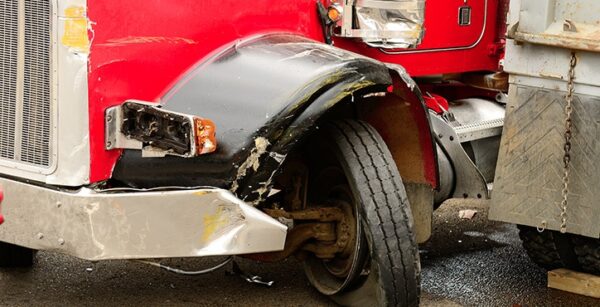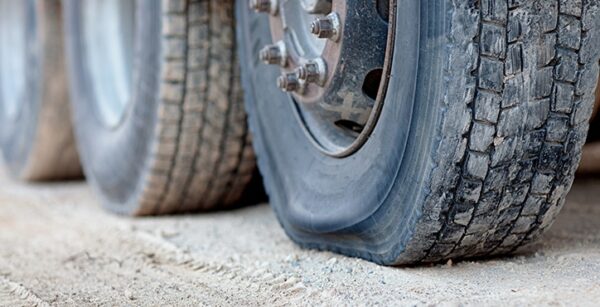Understanding Truck Tire Blowouts & Accidents
Our attorneys fight for the financial compensation you deserve
Motorists sharing the road with truck drivers are vulnerable to big-rig tire failure and have even tragically suffered fatal consequences. The potential dangers are extreme. It’s important to know what to do if you are involved in a truck accident caused by a tire blowout.

Tire blowout accidents are typically complex because they involve many possible contributing factors. The experienced truck accident attorneys at Fried Goldberg LLC fight for people who were injured due to negligence. Our practice is focused mostly on trucking litigation. We understand the complexity of these cases and know what it takes to get results.
Known to truckers and drivers alike as “road gators,” shredded remains of black rubber collected on the shoulder of the road are telltale signs of tire blowouts.
Any type of vehicular tire blowout is scary. But a tire accident involving a passenger car is not the same as an accident where a 50,000-pound truck is involved.
What should I do if see a truck tire blowout?
There are some steps you can take to protect yourself if a truck tire is blown out. You may notice a truck driver losing control, flying debris and loose cargo, or other drivers panicking. The truck itself may even start to roll over.
The best way to protect yourself from an emergency situation like this is to:
- Prevent over-reactive steering – Driving professionals warn about cars spinning out of control due to jerky, rough steering. Turning your steering wheel smoothly and firmly helps your tires conform to the new direction without overwhelming them.
- Using your antilock brake system (ABS) – If your vehicle is equipped with ABS, it’s important to test your vehicle and practice braking before taking it on the road. In general, your foot should remain firmly planted on the brake pedal, while ABS pumps the brakes for you so you can concentrate on steering to safety.
- If your vehicle does not have ABS, and you need to stop immediately, a sudden, hard brake application may cause loss of your vehicle’s steering control and wheel lockup. It’s best to manually pump the brakes. Smoothly and firmly place pressure on the brake pedal, then release the brakes slightly to allow the tires to resume rolling. Repeat.

Who can be held liable in a tire blowout accident?
Despite your best efforts to drive defensively, you may still be involved in a tire blowout accident. All drivers on the road are legally obligated to exercise “reasonable care” while driving. This not only includes following traffic laws, but also requires truck drivers and trucking companies to keep their vehicles in good repair, including the tires.
And while determining liability may seem obvious in some situations, each case is unique considering the limitless factors that may have contributed to the accident, including road, weather, and driver conditions. Liability is determined after thorough investigation. Some examples where liability may be reduced against the driver include:
- A tire blowout is caused by an external factor, like a pothole or obstacle in the road. The truck driver’s liability may be reduced, but their liability will also depend on the actions they took after the blowout.
- Tire manufacturers may be held liable for a tire blowout accident if a defect in the tire’s design led to the blowout. If an installer or a mechanic failed to notice the defect while installing the tire, or if the installation was not done properly, they also may be held partly liable.
Finding the reasons and cause for tire blowouts is important to determine the outcome of your case. If there are injuries involved, an investigation may become long and drawn-out since insurance companies seek to dilute their liability. If you have been injured, contact an experienced truck accident attorney as soon as possible.

How truck tire blowouts happen
Tire blowouts happen when a weakened tire is subjected to sudden pressure or impact that causes the tire to burst or rapidly lose air pressure. A blowout may result from any of the following factors:
- Potholes – Impact between the tire and a pothole or other obstacle can pinch the internal components of a tire, causing it to fray or even cut all the way through the tire’s fabric and rubber.
- Underinflation – Failing to keep tires at proper air pressure causes the tire’s internal components to flex more than they are designed to.
- Overinflation and heat – It is just as dangerous to overinflate tires, and this can be a serious problem when outdoor temperatures start to rise. Heat causes a tire to inflate, and when the hot freeway asphalt adds friction to an overinflated tire, a blowout is not far away.
- Overloading – The reason semi-trucks run on 18 wheels is because of their incredible weight. It requires the weight-carrying capacity of multiple tires to transport these huge vehicles and their payloads. When those tires’ maximum capacity is exceeded, it creates a situation ripe for tire blowouts.
- Wear over time – The truth is that a truck’s tires may experience any of these risk factors and not blow out right in the moment. Instead, the tire is weakened a little more each time by exposure to these factors. It may be weeks or months later when that critical mass is hit and the blowout takes place.
Rollover accidents caused by tire blowouts
Tire blowouts can cause a chain reaction that ends in serious consequences for a truck driver and any motorists in their vicinity.
One of the most serious consequences of a tire blowout is a truck rollover. This happens when the blowout throws off the weight balance of the truck. While a commercial semi-truck may look immovable, the fact is that its high center of gravity, the narrow distance between the left and right wheels, and the heavy, unstable load it carries make it vulnerable to small changes. The sudden change in height pulls the vehicle side to the ground. The term to describe this kind of truck accident is an “untripped rollover” since the truck did not hit an object for the accident to occur.
The aftermath can be devastating. After the trailer keels to one side with a corkscrew motion, then it snaps the truck cab over. For the driver inside, being thrown from the cab is just as dangerous as being trapped inside it.
Truck rollovers wreak havoc on the highway. In many instances, truck rollovers will cross over multiple lanes of traffic before coming to a stop. As for the damage it can cause to any other vehicle it hits, simply imagine what might be caused by a 50,000-pound vehicle thrashing uncontrollably around the highway.
Other accidents may be caused by tire blowouts simply because of the alarm they create. The loud noise that usually accompanies a tire blowout can frighten drivers, causing them to slam on their brakes. However, one of the immediate consequences of a tire blowout is a loss of tire traction, which makes any sudden movements very dangerous. Tire blowouts raise the chances that a driver will lose control of a truck even in the very act of pulling over.
Serious injuries caused by blowouts and rollovers
While there are miraculous tales of drivers walking away from a rollover, it’s not likely. Common injuries include:
- Broken bones
- Spinal cord injuries
- Lacerations
- Traumatic brain injuries
- Disfigurement
- Bruises
- Sprains
- Amputations
- Burns
- Emotional trauma
Contact our truck accident attorneys
At Fried Goldberg, we wrote the book on trucking law. Our attorneys have fought for the rights of victims in hundreds of accidents involving commercial trucks in Georgia and throughout the country. If you suffered from injury in a tire blowout accident, you may be entitled to financial compensation to help with your medical and property costs.
Contact us today to schedule a no-cost, no-obligation consultation about your legal options.
